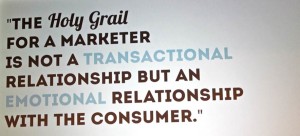What’s the Consumer Filter for High Value?
Published: March 9, 2016
Over the course of our last two blog posts, we have discussed the underlying fallacy of the newest budget club buzz phrase, low-price high-value and offered insight to the consumer “value equation” and the six attributes that compose it. In this blog we explore consumers’ value ideology and how it affects their perception of value.
Consumer research has identified three purchasing behavior constructs that frame how consumers assess the value of any purchase. These three consumer value-driver constructs are as follows: economically-driven, functionally or rationally-driven and emotionally-driven.
While it’s important to understand each of these three value-driver constructs (see sidebar), we think the golden nugget in all this lies in understanding why being able to appeal to emotionally-driven consumers, or in other instances, finding how to tap the emotions of your consumers, even if they are economically or functionally driven, can pay huge dividends.
Emotionally-driven consumers place an inordinate amount of weight on how a purchase will engage their emotions; essentially serving as an aphrodisiac. Emotional power speaks to how a purchase may enhance or stimulate one’s self-confidence, feelings of self-worth, tribal passions, narcissistic pleasures or sense of arrival. Just think of those consumers who wait for hours to purchase the newest Apple product or wax on about the virtues of Lulu Lemon. These are consumers who are willing to, and very often do, pay considerably more for a product with similar functional value because it holds emotional value.
Even economically and functionally-driven consumers can wilt under the weight of a product that penetrates their emotional veil and trigger powerful emotional feelings. Research shows that when you tap into the emotions, you tap a significantly larger reservoir of money. Even the most economically-driven consumer will pay more when the right emotional trigger is squeezed. Maybe Lord Burleigh, chief advisor to Queen Elizabeth I in the 1500’s, summed it up best when he said, “Win hearts and you have hands and purses.”
So now we can say it with firm conviction – low price is not high value and high value is not low price, except possibly for economically-driven consumers; instead high value will capture high prices as a result of capturing the heart and soul of the consumer.
The Three Consumer Value-Driver Constructs
Economically-Driven – Economically-driven consumers, while appreciating the various tangible and intangible attributes of a purchase, worship above all else price. You might say, “In price they trust.” These are consumers for who the highest purchasing priority is – to get the best possible deal.
Functionally-Driven – Functionally-driven consumers seek out products and experiences that fulfill a need and do it well. To these consumers, while they value the many tangible and intangible attributes of a purchase, what they worship above all else is whether the item they are acquiring does what they want, how they want it, when they want it, and lastly does it better than the alternatives.
Emotionally-Driven – Emotionally-driven consumers seek emotional enlightenment from their purchases. They pay homage to purchases that elevate their emotional plane and speak to their heart, soul and ego.
Tags: Consumer Filters, High Value
